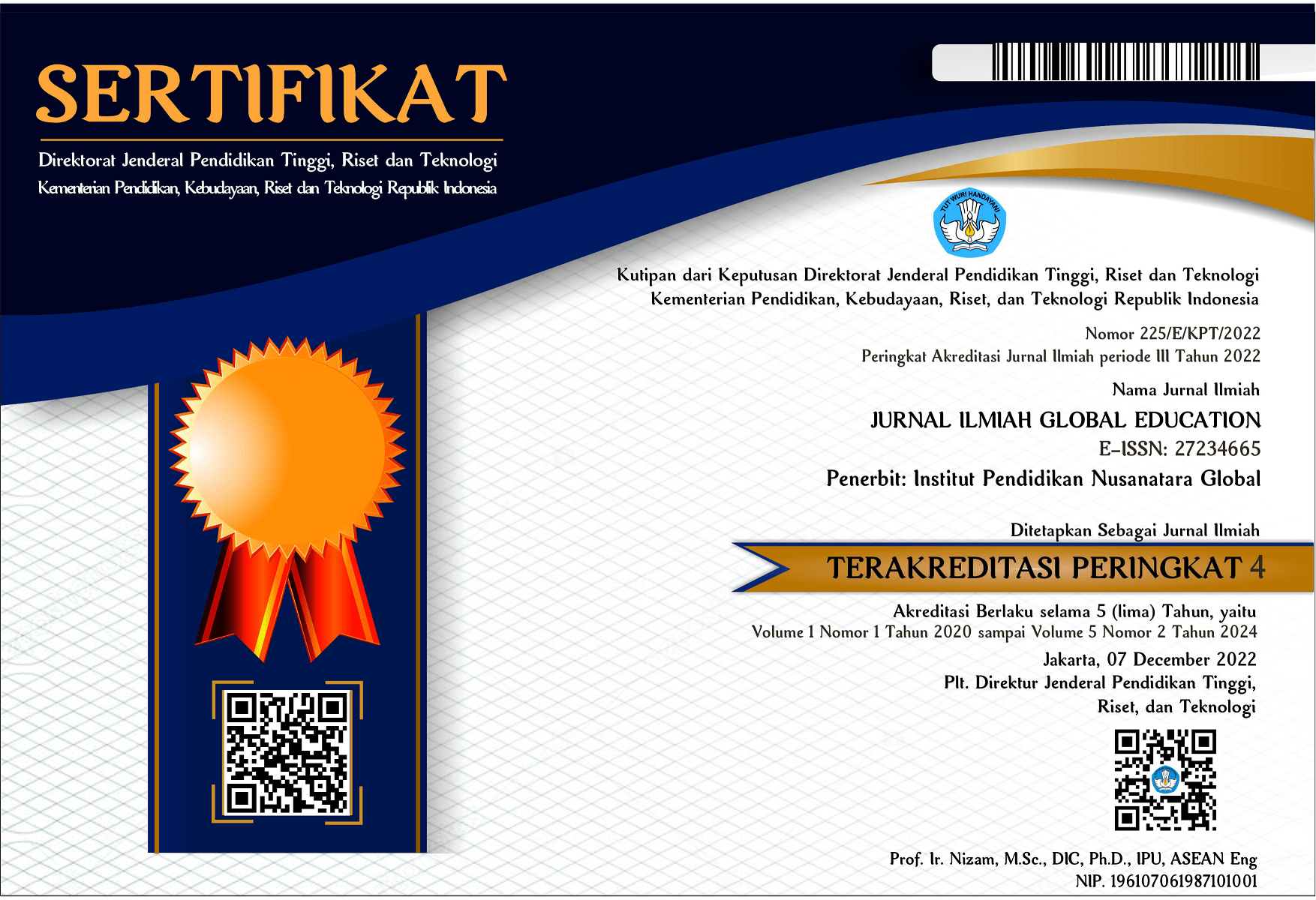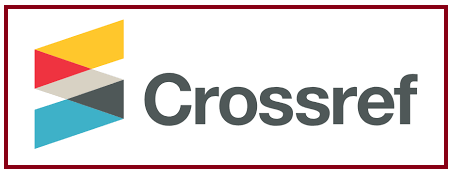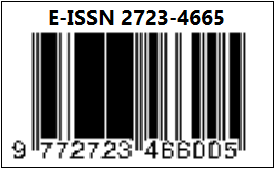DAMPAK LITERASI KEUANGAN DAN SIKAP KEUANGAN TERHADAP PERILAKU PENGELOLAAN KEUANGAN DENGAN NIAT SEBAGAI VARIABEL MEDIASI
DOI:
https://doi.org/10.55681/jige.v4i2.797Keywords:
Financial Literacy, Financial Attitude, Financial Management Behavior, IntentionsAbstract
This study aims to examine and analyze the impact of Financial Literacy and Financial Attitudes on Financial Management Behavior with Intentions as Intervening Variables. This research is quantitative research with data collection techniques using a questionnaire. The sample is 140 respondents. The sampling technique used is purposive sampling with predetermined criteria, namely people who earn at least IDR 3,000,000 per month. Processing primary data using statistical analysis techniques Package for Social Science (SPSS) with multiple regression analysis methods, path analysis and sobel test. The results of this study indicate that financial literacy has a negative but not significant effect on intentions, while financial attitudes have a positive and significant effect on intentions. Furthermore, financial literacy and intention have a positive but not significant effect on financial management behavior, while financial attitudes have a positive and significant effect on financial management behavior. In addition, the results of the study show that intention is not able to mediate financial literacy on financial management behavior but intention is able to mediate financial attitudes on community financial management behavior with a significant influence.
Downloads
References
Agung, A. I. G. L., & Made, P. N. (2016). Pengaruh Pendidikan Kewirausahaan, Self Efficacy Dan Locus of Control Pada Niat Berwirausaha. E-Jurnal Manajemen Unud, 5(2), 1160–1188.
Alamsyah, M. F. (2020). Pengaruh Literasi Keuangan dan Kualitas Manajemen Keuangan Terhadap Kinerja Keuangan Pada UKM Meubel di Kota Gorontalo. Forum Ekonomi, 22(2), 245–255.
Ameliawati, M., & Setiyani, R. (2018). The Influence of Financial Attitude, Financial Socialization, and Financial Experience to Financial Management Behavior with Financial Literacy as the Mediation Variable. KnE Social Sciences, 3(10), 811. https://doi.org/10.18502/kss.v3i10.3174
Anggraeni, B. D. (2016). Pengaruh Tingkat Literasi Keuangan Pemilik Usaha Terhadap Pengeloaan Keuangan. Studi Kasus : Umkm Depok. Jurnal Vokasi Indonesia, 4(1). https://doi.org/10.7454/jvi.v4i1.50
Dew, J., & Xiao, J. J. (2011). The financial management behavior scale: Development and validation. Journal of Financial Counseling and Planning, 22(1), 43–59.
Emekci, S. (2019). Green consumption behaviours of consumers within the scope of TPB. https://doi.org/10.1108/JCM-05-2018-2694
Gahagho, Y. D., Rotinsulu, T. O., & Mandeij, D. (2021). Pengaruh Literasi Keuangan Sikap Keuangan Dan Sumber Pendapatan Terhadap Perilaku Pengelolaan Keuangan Mahasiswa Fakultas Ekonomi Dan Bisnis Unsrat Dengan Niat Sebagai Variabel Intervening. Jurnal EMBA: Jurnal Riset Ekonomi, Manajemen, Bisnis Dan Akuntansi, 9(1), 543–555.
Hanim, L., Soponyono, E., & Maryanto, M. (2022). Pengembangan UMKM Digital di Masa Pandemi Covid-19. Prosiding Seminar Nasional Penelitian Dan Pengabdian Kepada Masyarakat, 2(1), 30–39. https://doi.org/10.24967/psn.v2i1.1452
Hassan, L. M., Shiu, E., & Parry, S. (2016). Addressing the cross-country applicability of the theory of planned behaviour (TPB): A structured review of multi-country TPB studies. Journal of Consumer Behaviour, 15(1), 72–86. https://doi.org/10.1002/cb.1536
Hogarth, J., & Hilgert, M. (2002). Financial Knowledge, Experience and Learning Preferences: Preliminary Results from a New Survey on Financial Literacy Marianne A. Hilgert, Federal Reserve Board. Consumer Interest Annual, 48, 1–7. https://www.consumerinterests.org/assets/docs/CIA/CIA2002/hogarth-hilgert_financial knowledge.pdf
Kennedy, B. P. (2013). The theory of planned behavior and financial literacy: A predictive model for credit card debt? Theses, Dissertations and Capstones. Paper 480, 84. https://doi.org/Paper 480
Kusumastuti, D. K. (2021). Peningkatan Literasi Keuangan melalui Pelatihan Evaluasi dan Perencanaan Keuangan Sehat Berbasis syariah pada Pengusaha Muslim Skala Mikro Kecil di Purwokerto. Solidaritas: Jurnal Pengabdian, 1(1), 31–42. https://doi.org/10.24090/sjp.v1i1.5136
Marcolin, S., & Abraham, A. (2006). Financial literacy research: current literature and future opportunities. Proceedings of the 3rd International Conference on Contemporary Business, Australia, September, 21–22.
Mardianah, A., & Rr, I. (2021). Model Hubungan Literasi, Pengalaman dan Perilaku Pengelolaan Keuangan Keluarga: Peran Niat Berperilaku Sebagai Mediasi. Jurnal Manajemen Dan Keuangan, 10(2), 129–143. https://doi.org/10.33059/jmk.v10i2.3564
Muntahanah, S., Cahyo, H., Setiawan, H., & Rahmah, S. (2021). Literasi Keuangan, Pendapatan dan Gaya Hidup terhadap Pengelolaan Keuangan di Masa Pandemi. Jurnal Ilmiah Universitas Batanghari Jambi, 21(3), 1245. https://doi.org/10.33087/jiubj.v21i3.1647
Musyaffi, A. M., Gurendrawati, E., Purwohedi, U., & Zakaria, A. (2022). Peningkatan Literasi Keuangan Digital Melalui Program Praktisi Mengajar. Jurnal Perduli, 3(2), 55–66. http://journal.unj.ac.id/unj/index.php/perduli%0APeningkatan
Nuryana, I., & Rahmawati, N. (2020). Peran literasi keuangan dalam memediasi pengaruh sikap keuangan, dan teman sebaya terhadap perilaku pengelolaan keuangan. Economic Education Analysis Journal, 9(1), 161–181. https://doi.org/10.15294/eeaj.v9i1.37246
Pradiningtyas, T. E., & Lukiastuti, F. (2019). Pengaruh Pengetahuan Keuangan dan Sikap Keuangan terhadap Locus of Control dan Perilaku Pengelolaan Keuangan Mahasiswa Ekonomi. Jurnal Minds: Manajemen Ide Dan Inspirasi, 6(1), 96. https://doi.org/10.24252/minds.v6i1.9274
Puspitasari, R., & Astrini, D. (2021). Dampak Literasi Dan Inkuisi Keuangan Terhadap Kinerja Pelaku UMKM Di Kota Bogor. Jurnal Ilmiah Manajemen Kesatuan, 9(2), 181–190. https://doi.org/10.37641/jimkes.v9i2.771
Raharja, S. J., & Natari, S. U. (2021). Pengembangan Usaha Umkm Di Masa Pandemi Melalui Optimalisasi Penggunaan Dan Pengelolaan Media Digital. Kumawula: Jurnal Pengabdian Kepada Masyarakat, 4(1), 108. https://doi.org/10.24198/kumawula.v4i1.32361
Rai, K., Dua, S., & Yadav, M. (2019). Association of Financial Attitude, Financial Behaviour and Financial Knowledge Towards Financial Literacy: A Structural Equation Modeling Approach. FIIB Business Review, 8(1), 51–60. https://doi.org/10.1177/2319714519826651
Rosalia, L. (2018). Persepsi Mahasiswa Akuntansi Terhadap Tindakan Whistleblowing dalam Upaya Pencegahan dan Pendeteksian Fraud. Jurnal Audit Dan Akuntansi Fakultas Ekonomi Dan Bisnis Universitas Tanjungpura, 7(1), 19–48.
Rulliyani, & Subambang. (2020). Determinan Perilaku Pengelolaan Keuangan Masyarakat Kota Medan. Jurnal Ekonomi Hukum & Humaniora, 2(2), 112–125.
Safitri, E., Sriyunianti, F., & Chandra, N. (2023). Pengaruh Literasi Keuangan dan Sikap Keuangan terhadap Perilaku Pengelolaan Keuangan UMKM (Studi Kasus pada Usaha Mikro Bidang Kerajinan di kota …. Jurnal Akuntansi, Bisnis …, 2(1), 118–128. https://akuntansi.pnp.ac.id/jabei/index.php/jabei/article/view/64
Sari, D. E. (2018). Pendidikan Literasi Keuangan Melalui Program Kemitraan dengan Bank untuk Mengurangi Perilaku Konsumtif pada Mahasiswa. Jurnal Pendidikan Ilmu Sosial, 28(1), 22–30.
Seni, N. N. A., & Ratnadi, N. M. D. (2017). Theory of Planned Behavior Untuk Memprediksi Niat Berinvestasi. E-Jurnal Ekonomi Dan Bisnis Universitas Udayana, 12, 4043. https://doi.org/10.24843/eeb.2017.v06.i12.p01
Sugiyono. (2019). Metode Penelitian Kuantitatif, Kualitatif, dan R&D. Alfabeta.
Yap, R. J. C., Komalasari, F., & Hadiansah, I. (2018). The Effect of Financial Literacy and Attitude on Financial Management Behavior and Satisfaction. Bisnis & Birokrasi Journal, 23(3), 3–5. https://doi.org/10.20476/jbb.v23i3.9175
Downloads
Published
How to Cite
Issue
Section
License
Copyright (c) 2023 JURNAL ILMIAH GLOBAL EDUCATION

This work is licensed under a Creative Commons Attribution-ShareAlike 4.0 International License.













